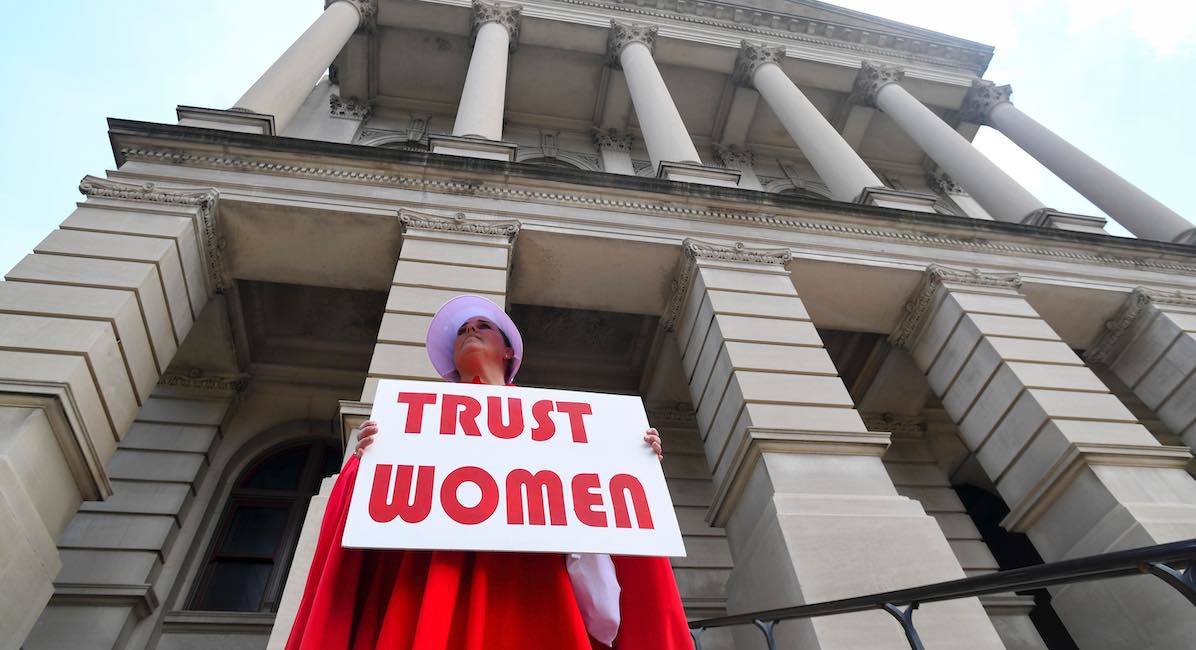Fulton County Superior Judge Robert McBurney, who struck down Georgia’s LIFE Act in 2022 before the state Supreme Court reversed his decision, has again ruled to strike down the Act as unconstitutional. This means abortion is now legal in Georgia up to 22 weeks gestation.
Though media has noted that McBurney was appointed by a Republican governor in 2012, the judge’s pro-abortion bias seems clear in his 26-page ruling. For example, McBurney draws comparisons between a legislator, a judge, and a “commander from The Handmaid’s Tale” (emphasis added):
… the State’s interest in protecting ‘unborn’ life is compelling, until that life can be sustained by the State … the balance of rights favors the woman.
For these women, the liberty of privacy means that they alone should choose whether they serve as human incubators for the five months leading up to viability. It is not for a legislator, a judge, or a Commander from The Handmaid’s Tale to tell these women what to do with their bodies during this period when the fetus cannot survive outside the womb any more so than society could — or should — force them to serve as a human tissue bank or to give up a kidney for the benefit of another.
He also stated that “When a fetus growing inside a woman reaches viability, when society can assume care and responsibility for that separate life, then — and only then — may society intervene.”

Baby Olivia – 20 weeks after fertilization, 22 weeks LMP/gestation
McBurney noted in his ruling that the plaintiffs in the case had asked the court to declare that a ‘right to abortion’ is included within the state constitution’s “protections for liberty and privacy.” And, consistently, McBurney repeatedly emphasized the ideas of a woman’s liberty and privacy over the very existence of a developing human being.
“This dispute is fundamentally about the extent of a woman’s right to control what happens to and within her body,” he wrote, adding that “The baseline rule is clear: a legally competent person has absolute authority over her body and should brook no governmental interference in what she does — and does not do — in terms of health, hygiene, and the like.”
McBurney also appeared to compare a person’s decision to get tattoos or to overeat or to starve herself (“gluttony and self-deprivation”) to a woman’s right to “refuse… medical care” for a child with a detectable heartbeat in her womb. He went on to argue that until a preborn child is ‘viable’, the only person who can assume that child’s care is the mother, and she cannot be forced to do so… because she has “fundamental rights” to make “healthcare choices” that include ending the life of her child in the womb until that child can be cared for by someone else.
Of course, intentionally and directly killing a defenseless human being cannot reasonably be considered “health care.”
Notably, pro-abortion advocates have railed against the idea of things like artificial wombs because what they truly seek is not bodily autonomy (to not be pregnant), but the supposed ‘right’ to have no living biological offspring. They argue that in such cases, a woman would still be ‘forced’ to be a biological mother against her will, thus violating her ‘reproductive autonomy.’
McBurney later adds that there is “compelling record evidence about the physical, mental, and emotional impact of unwanted pregnancies on the women who are forced by law to carry them to term (as well as on their other living children).” It is upon this so-called “evidence” that he based his finding that “until the pregnancy is viable, a woman’s right to make decisions about her body and her health remains private and protected….”
He then references another court case when discussing this “evidence” instead of citing any direct research.
Typically, abortion advocates will point to the debunked Turnaway Study as “evidence” — but this study has a long list of problems and shortcomings that make it very poor “evidence” of anything except how easily the media spreads pro-abortion propaganda.
As noted by Newsweek, “McBurney had previously ruled against the LIFE Act in November 2022 following a lawsuit filed by the SisterSong Women of Color Reproductive Justice Collective. At the time, the judge wrote that because the law was unconstitutional when it was passed in 2019, it was never valid. Georgia’s Supreme Court overturned McBurney’s decision last year, allowing the law to remain in effect while the lower courts ruled on other merits of the plaintiff’s complaint.”
Governor Brian Kemp sent a statement to Newsweek today following Judge McBurney’s decision, with spokesperson Garrison Douglas stating, “Once again, the will of Georgians and their representatives has been overruled by the personal beliefs of one judge. Protecting the lives of the most vulnerable among us is one of our most sacred responsibilities, and Georgia will continue to be a place where we fight for the lives of the unborn.”
NBC News reports the state’s plans to appeal, writing, “Kara Murray, a spokesperson for Georgia Attorney General Christopher Carr, said, ‘We believe Georgia’s LIFE Act is fully constitutional, and we will immediately appeal the lower court’s decision.'”







